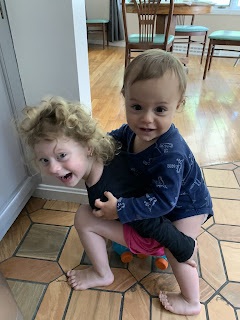At just over 13 months old, Mateo has a handful of words. It's been exciting and emotional to hear his baby babble begin to sound like real words. He calls me "Mama" and calls Francisco "Dada" (even though I've tried my best to get him to say "Papa" instead.) He refers to food as "nom nom," just like Maya did when she was his age... and still does. He tries to say "agua" and "gracias," but hasn't quite mastered either of those yet, along with a few other multi-syllable words.
It is well-documented that when parents use infant-directed speech, otherwise known as baby talk, it facilitates learning. And being home with Maya, Sofia, and me all day definitely gives Teo a good amount of language input. I learned when Maya was born the importance of talking directly to your baby. Reading books, singing songs, and narrating your day exposes them to a variety of vocabulary words and the phonemes and morphemes of your native language. But it is also important to talk in baby talk, because infants tend to pay more attention and respond more eagerly to baby talk than to normal adult conversation. The playfully exaggerated and high-pitched tone your voice takes lights up their mind and by imitating your baby, you'll send an important message: what he is feeling and trying to communicate matters to you.
There's actually six universal stages of language development that happen between birth and 30 months. The prelinguistic stage, in which babies coo or make vowel-like sounds, usually zero to six-months-old. The babbling stage, in which babies begin to produce consonant-vowel combinations, usually six to eight-months-old. The holophrase or one-word sentence, in which babies use a single word to represent a sentence or emotional state, usually nine to 18-months-old. Then little ones enter the two-word sentence phase around 18 to 24-months-old, multiple-word sentences from 24 to 30-months-old, and can speak in more complex grammatical structures as they reach and surpass their third birthday.
Mateo has finally graduated from canonical babbling to the one-word sentence phase. Before Age 2, babies can usually recognize the names of familiar objects or family members, use gestures like pointing or waving good bye, can understand simple statements such as “give me” or “all gone," and can make one or two syllable sounds that stand for items they want. And I'm proud to report Mateo can do all of the above.
Right now, he can make a few animal noises: he can crow like a rooster, moo like a cow, and bark like a dog. In Spanish, dogs make a guau guau sound, so Teo refers to dogs as "guau guau" and calls both roosters (gallos) and chickens (gallinas) "ga ga."
Yesterday, when Maya woke up from her nap crying, I asked Mateo, "Donde esta su hermana?" and he walked around the house looking for her, calling, "Ana! Ana!" As a muti-syllable word, Teo can't quite pronounce hermana (sister in Spanish), but he was impressively close with Ana. When she finally came out of her room, groggy with sleep, his face lit up and he gave her a humungous hug.
So it is clear that he is developing his ability to make one or two syllable sounds stand for what he wants, but sometimes his new-found language skills get him into trouble...
He also has recently discovered piggyback rides, which in Spanish is referred to as horseback rides. Caballito, we call it, meaning "horsey." He jumps with glee when we let him ride on our back or shoulders. When Francisco came home from work this the afternoon, Teo ran to the door to greet him. Francisco tossed Mateo up on his shoulders, and stood talking with a few of his workers outside the garage. Mateo started bouncing up and down and saying "Caca! Caca!" The guys burst out laughing and immediately reprimanded the littlest guy for saying something inappropriate (caca is a bad word for poop in Spanish!) I had to intervene and explain that Teo was trying to say caballo, but has only mastered the first syllable.
Although I might need to be his intermediary translator for now, I'm impressed and proud to watch Mateo's language develop, and I can't wait to see what other words he comes up with!





Comments
Post a Comment